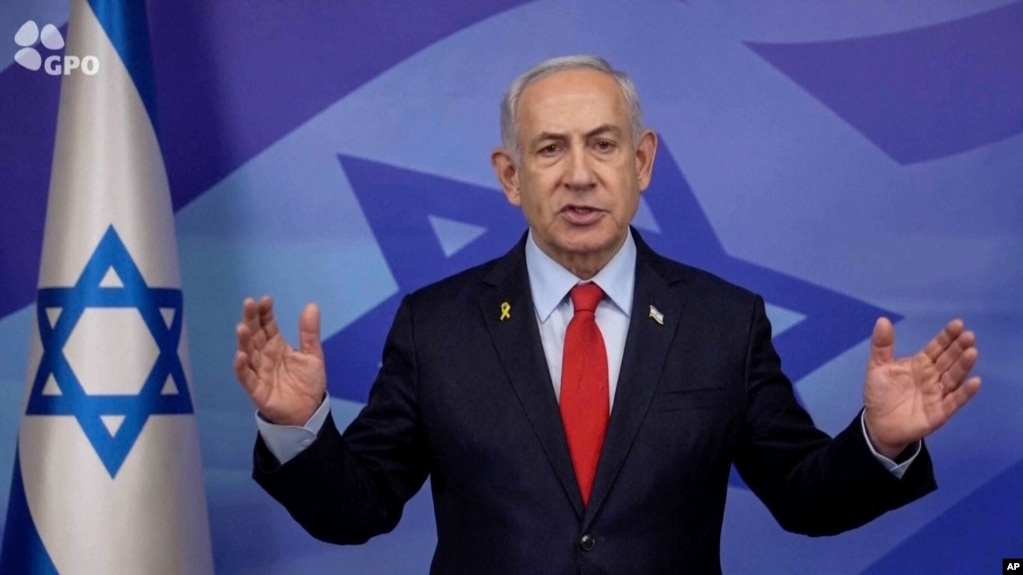
Israel agreed to a ceasefire with Lebanon’s Hezbollah militants late Tuesday that will take effect early Wednesday morning, potentially ending more than a year of fighting.
As Israeli forces bombarded Hezbollah targets in the southern suburbs of Beirut, Prime Minister Benjamin Netanyahu said in a nationally televised address that he would urge security cabinet ministers to approve the ceasefire, which they did shortly after.
The United States and France played a major role in the mediation process.
President Joe Biden called the ceasefire “a critical step in ending violence in the Middle East” at the White House. He said Iran and its proxies – Lebanon’s Hezbollah and Gaza’s Hamas militants – had “paid a heavy price” in more than a year of fighting Israeli troops.
He said Israel’s agreement with Hezbollah “is about a permanent cessation of hostilities.”
But Biden warned, “Let me be clear, if Hezbollah or anyone else breaks the deal and poses a direct threat to Israel, then Israel reserves the right to self-defense under international law, just as any country facing a terrorist organization that has vowed to destroy it.”
Biden said that now that Hezbollah has agreed to stop attacking Israel, “Hamas now has to make a choice. Their only way out is to release the hostages, including American citizens.”
“In the coming days, the United States will again push Turkey, Egypt, Qatar, Israel and others to achieve a ceasefire in Gaza,” Biden said.
He said Israel’s agreement with Hezbollah shows that “peace is possible.”
Netanyahu said he favors a ceasefire with Hezbollah so that Israel can focus on responding to the broader threat posed by Iran to Israel, replenishing its troop and ammunition supplies, and isolating Hamas in the ongoing battle between Israel and Gaza.
Netanyahu vowed that if Hezbollah launches another attack on Israel or rearms, Israel will immediately resume bombing militant sites in Lebanon.
“The duration of the ceasefire will depend on the situation in Lebanon,” Netanyahu said. “With the full understanding of the United States, we retain full military freedom of action – if Hezbollah violates the agreement and tries to arm itself, we will attack.”
Israel attacked militant targets in Lebanon a day ago.
Israel attacked 20 buildings that the military said were Hezbollah strongholds and warned non-combatants living there to flee to safety and keep at least 500 meters away. This is the largest number of buildings that the IDF has warned residents of an impending attack in one day.
The airstrikes caused thick smoke to billow over the Lebanese capital. At least 10 attacks were carried out simultaneously, and the Israeli Air Force called it a “large-scale attack.”
The attack appears to be Israel’s last attempt to gain the upper hand in its war with Hezbollah, as Netanyahu said he was open to a ceasefire even before addressing the nation. The militants began attacking Israel in October 2023 in support of Hamas militants fighting Israel in Gaza.
The ceasefire, brokered by U.S. and French diplomats, will halt fighting and initiate a 60-day ceasefire during which Israel and Hezbollah will withdraw from southern Lebanon.
The deal comes after U.S. Secretary of State Antony Blinken told a news conference at a Group of Seven foreign ministers meeting in Italy on Nov. 26 that the ceasefire was “the best way to guarantee peace and stability.”
Blinken said the deal to end the fighting between Israel and Hezbollah could also prompt Hamas to reach a long-stalled ceasefire in Gaza because Hamas would no longer have an Iranian-funded ally fighting Israel on a second front in northern Israel and Lebanon.
Under the ceasefire, Israeli troops must withdraw south of the Lebanese-Israeli border and Hezbollah relocate north of the Litani River. The agreement calls for Lebanese troops not involved in the fight between Israel and Hezbollah to patrol areas between the warring parties.
While Netanyahu said he favored the deal, it was unclear whether some of his far-right colleagues in the Israeli parliament would accept the proposal. Hezbollah leader Naim Qassem said last week that the militants would agree to a ceasefire if Israel stopped attacking Lebanon and Lebanon retained its sovereignty.
But difficulties remain in reaching a ceasefire agreement, such as how to monitor Hezbollah’s withdrawal from the border area.
Earlier in the day, European Union foreign policy chief Josep Borrell called on Israel to agree to a ceasefire, saying “no more excuses.”
Borrell told reporters before the Group of Seven meeting that the ceasefire was “absolutely necessary” for civilians displaced by months of fierce fighting on the Israeli-Lebanese border.
Borrell expressed hope that the Netanyahu government would approve the ceasefire on Tuesday and not seek to add additional terms that could delay or derail the agreement.
Borrell said, “No more excuses. No more additional demands. Stop fighting. Stop killing. Let’s start thinking about peace.”
The Lebanon war has triggered a humanitarian crisis that has displaced hundreds of thousands of people.
The United Nations World Food Program announced Monday that it has provided emergency assistance to more than 500,000 people in Lebanon since the conflict began. The World Food Program said it plans to assist 1 million people and will continue to work to provide critical assistance to affected communities.
On October 7, 2023, Hamas militants launched a terrorist attack on Israel, killing 1,200 people and taking about 250 hostages, triggering the current Middle East war.
According to the Gaza Ministry of Health, Israel’s counterattack in Gaza has killed more than 44,235 Palestinians. The statistics of the Gaza Ministry of Health do not distinguish between fighters and civilians. The Israeli military said the death toll includes thousands of Hamas fighters.
After Gaza Hamas attacked Israel, its ally Hezbollah in Lebanon immediately attacked northern Israel with rockets to show its support for Hamas. In September this year, Israel expanded its military operations against Hezbollah.
Both Hamas and Hezbollah are designated as terrorist organizations by the United States, Britain and other Western countries.




